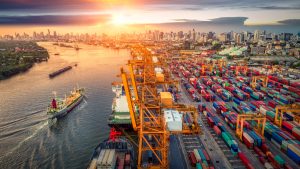Most of the world’s manufactured goods and products are transported by container ships, but the industry is facing a tough and unpredictable future.
Overcapacity, trust issues and outdated systems plagued by human errors, missing and inaccurate documents and even substandard goods have a fundamental impact on the industry’s prospects. These challenges, along with higher demands from society for transparency, accountability, and responsibility in the logistics chain, drives the industry towards exploring new solutions.
Shipping industry is facing high administrative burdens of managing and writing claims with a lot of paperwork requiring signatures multiple times. Despite all this stress, a small service disruption or insufficient capacity anywhere in the network could result in the shipment delays, increased costs or wrong deliveries. Moreover, a hazard striking to shipment is thievery, which is not only armed robbery but the latest security threat to the maritime industry comes from the hackers.
As far as it goes back, the whole shipping community has never been on the same platform for the issues related to payments and transactions. Lack of information prevails among importers and exporters regarding the type of cost of ships and transport fees. The challenges facing the shipping industry are many, the major ones are listed below:
Challenges For Carriers
- Security Threats
The high number of incidents of piracy and armed robbery against ships off the somalia coast and in the Gulf of Aden is something that the whole world is aware of, and is a growing concern for the maritime industry that is heavily affected by these incidents.
- Environmental Regulations
Maritime transport emits around 1000m tons of Carbon dioxide and is usually responsible for about 2.5% of global greenhouse gas emissions. These emissions are predicted to increase up to 250% by 2050 in absence of installation of newer energy saving technologies. There is a growing concern over the impact of global shipping activities on the environment greenhouse effect and danger to aquatic life.
- Lack of Transparency
Bad tracking is caused by equally harmful gaps in transparency. While tracking issues are systematic and inherent to the task of moving goods, the failures of transparency are largely due to bad data handling practices. Often, due to fragmentation, uncertainty, or to protect the exclusivity of their arrangements, brokers can’t or won’t tell a shipper exactly what carrier and driver are carrying their freight.
- Labor Disputes and Job Cuts
Who can forget the month-long West Coast dockworkers slowdown, which brought shipping industry business to a standstill in February 2015? Or, another incident in Dec 2015 when the Maritime Union of Australia (MUA) held the ship of global mining giant Alcoa, hostage for two months, disrupting the operations of the port of Portland? Repeatedly, labor disputes and strikes have disrupted the shipping industry and created huge gaps in profitability and product rollouts. The shipping rates increase, and the supply chain becomes more overloaded.
Challenges for Shippers
- Finding the best options
Cargo can be moved from point to point in a number of different ways. While it’s convenient to have options, many shippers are overwhelmed or simply unaware of the many different choices they have. Understanding the shipping landscape could save time and money at the end of the day.
- Finding the best rates
Looking for the best freight shipping rates can be time-consuming when not equipped with the right tools or processes. Most of the time, shippers have contracts in place or have to make multiple phone calls just to find the best rate for one shipment. Having a transportation management system in place could provide a solution to this problem.
- Preparation and Documentation
Shippers sometime aren’t prepared to take on the process. From filling out the bill of lading to identifying freight classes, one misstep can result in surcharges, delays, or customs holds when shipping internationally. Shippers must be sure to prepare ahead of time with the necessary knowledge to get the job done.
- Shipping demand exceeds forecast
Exporters and Importers often find themselves short on containers for bulk shipping capacity when they need them most. This leads to delays, additional costs, potential penalties and strained relations with clients as well as partners. In addition, shippers of time-definite or sequenced cargo flows rish delays, performance penalties, and lost business when they can’t deliver on time, compelling some to resort to air freight or other alternatives in order to prevent penalties but the cost often outweighs the penalties. In general, finding the right balance between annual service contracts and the spot market is difficult and comes with financial impacts.